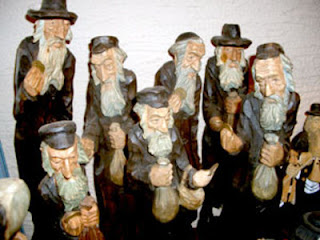Bieganski,
the Brute Polak Stereotype
speaks at length about March of the Living and other approaches to Poland that
support the Bieganski, Brute Polak stereotype.
This blog has devoted several posts to March of the Living, including March of the Living: A Rabbinical Student's Sermon and March of the Living Responds.
A previous blog post addresses the work of Prof. Jackie Feldman at Ben Gurion University: Why Stereotype Poles? Why Distort WW II History? Here's Why.
Prof. Jackie Feldman's 2010 book, "Above the Death Pits, Beneath the Flag," is summarized on Amazon thus:
"Israeli youth voyages to Poland are one of the most popular and influential forms of transmission of Holocaust memory in Israeli society. Through intensive participant observation, group discussions, student diaries, and questionnaires, the author demonstrates how the State shapes Poland into a living deathscape of Diaspora Jewry.
In the course of the voyage, students undergo a rite de passage, in which they are transformed into victims, victorious survivors, and finally witnesses of the witnesses. By viewing, touching, and smelling Holocaust-period ruins and remains, by accompanying the survivors on the sites of their suffering and survival, crying together and performing commemorative ceremonies at the death sites, students from a wide variety of family backgrounds become carriers of Shoah memory. They come to see the State and its defense as the romanticized answer to the Shoah. These voyages are a bureaucratic response to uncertainty and fluidity of identity in an increasingly globalized and fragmented society. This study adds a measured and compassionate ethical voice to ideological debates surrounding educational and cultural forms of encountering the past in contemporary Israel, and raises further questions about the representation of the Holocaust after the demise of the last living witnesses."
In his review, prolific Amazon reviewer Jan Peczkis states that the book clearly depicts Poles being blamed for the Holocaust in a way that German Nazis are not. Jan Peczkis' review of "Above the Death Pits" is here.
I am grateful to Jan Peczkis for drawing my attention to the book.
This blog has devoted several posts to March of the Living, including March of the Living: A Rabbinical Student's Sermon and March of the Living Responds.
A previous blog post addresses the work of Prof. Jackie Feldman at Ben Gurion University: Why Stereotype Poles? Why Distort WW II History? Here's Why.
Prof. Jackie Feldman's 2010 book, "Above the Death Pits, Beneath the Flag," is summarized on Amazon thus:
"Israeli youth voyages to Poland are one of the most popular and influential forms of transmission of Holocaust memory in Israeli society. Through intensive participant observation, group discussions, student diaries, and questionnaires, the author demonstrates how the State shapes Poland into a living deathscape of Diaspora Jewry.
In the course of the voyage, students undergo a rite de passage, in which they are transformed into victims, victorious survivors, and finally witnesses of the witnesses. By viewing, touching, and smelling Holocaust-period ruins and remains, by accompanying the survivors on the sites of their suffering and survival, crying together and performing commemorative ceremonies at the death sites, students from a wide variety of family backgrounds become carriers of Shoah memory. They come to see the State and its defense as the romanticized answer to the Shoah. These voyages are a bureaucratic response to uncertainty and fluidity of identity in an increasingly globalized and fragmented society. This study adds a measured and compassionate ethical voice to ideological debates surrounding educational and cultural forms of encountering the past in contemporary Israel, and raises further questions about the representation of the Holocaust after the demise of the last living witnesses."
In his review, prolific Amazon reviewer Jan Peczkis states that the book clearly depicts Poles being blamed for the Holocaust in a way that German Nazis are not. Jan Peczkis' review of "Above the Death Pits" is here.
I am grateful to Jan Peczkis for drawing my attention to the book.





























